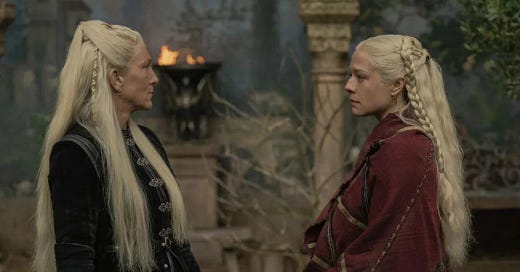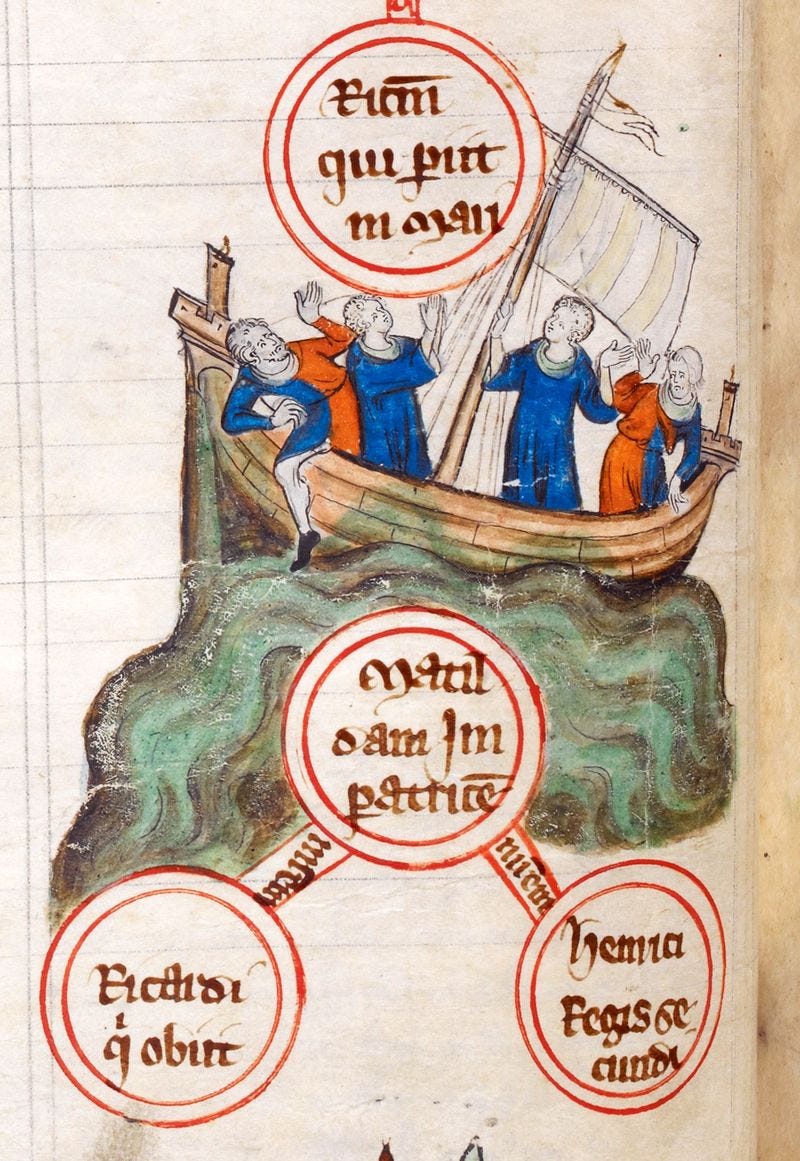I had pretty mixed feelings about the Game of Thrones prequel The House of the Dragon, but I did enjoy the fact — much like its predecessor — the inspiration of George R.R. Martin’s swashbuckling yet sadistic epic was medieval history.
I mostly work on the later Middle Ages, usually Edward I onwards, but one of the characters that does interest me is Empress Matilda: the mother of the Plantagenet dynasty and a woman who should have been queen but was not, because…well… she was a woman. She was the direct inspiration in part for the character Princess Rhaenys Targaryen, known as ‘the Queen Who Never Was’, but mostly the inspiration for the series lead, Rhaenyra Targaryen and the war that ensued when she did not ascend the throne following the death of her father Viserys Targaryen. Even though he had named her heir.
The true story of The House of the Dragon is in the succession crisis that arose after the sinking of the White Ship in the Channel, the stretch of water between England and France in 1125.
Filled with the royal party of Henry I, including his son and heir William Adelin, the White Ship crashed into rocks off the coast Barfleur in the darkness of the night and capsized. Most of those on board subsequently drowned, including William Adelin. Henry I had not been onboard, but returned to England crushed to discover the death of his son. What followed has become known to posterity as The Anarchy, a conflict in British royal history over the succession of a woman. However, it was simply considered then to be a power vacuum.
Henry I had one legitimate child left following William Adelin’s death, Matilda. And it was Matilda that he wanted to secure as his heir.
At this point, the record reveals very little about Matilda which is probably indicative that she was an unknown entity in England, having not set foot in the country for sixteen years after her first marriage. We know that she was born in England in 1102 to Henry I and her mother Edith-Matlilda of Scotland. Like other members of the Plantagenet royal family her first language would have been Norman French but she would have understood and studied Latin — the language of the Church as well as international diplomacy and literary culture in England, with chroniclers of the time recording their work in Latin. When she was 12 she was married to Heinrich V emperor of Germany at Worms Cathedral on the banks of the Rhine. One thing we do know about Matilda’s experience in Germany was that she played her part with aplomb, acting as interceder on behalf of her people, intercession being a major part of queenship in this period. People in Germany remembered her as ‘Matilda the Good’. In 1125 when Matilda was just 23 Heinrich died, leaving her a widow with little purpose in Germany. After her late husband’s funeral she left Germany to join her father in Normandy and take up the mantle as his heir and future queen of England.

With Matilda as his only direct heir Henry acted fast in and at Christmas 1126 he had presented Matilda to his magnates at a gathering of the court at both Westminster and Windsor. The point was formal recognition, before a mass of important people that Matilda was his heir and each of these nobles was required to make a solemn oath that they would protect her accession and aid her rule. He did this not once but twice, making his nobles repeat their oath again in 1131, acknowledging Matilda as a ruler in waiting.
The problem was that she would rule with her second husband Geoffrey Count of Anjou, Geoffrey Plantagenet — an unpopular man amongst the barons in England, who Matilda married in 1128 at the arrangement of her father who considered the match to be diplomatically secure.
In 1135 Henry I died, and the future of Matilda’s queenship looked immediately uncertain. England’s barons did not believe that Matilda, as a woman, could rule in her own right and were suspicious of whether Geoffrey would attempt to seize power. This was a problem that Norman kings brought on themselves, for it was Norman law and Norman gendered principle that made female succession illegal. This law only came into England in 1066, stripping women of their inheritance rights and ability to manage land and property as femme sole- single women. Matilda had been crowned Empress at the age of eighteen, a controversial act from her first marriage as a child to the Holy Roman Emperor Henry V. It is a title that suited her and one that she continued to use, in order to impress and intimidate. Matilda’s succession was an extremely rare circumstance, riddled with fear and trepidation.
Despite Matilda’s best efforts to uphold her father’s wishes and conduct herself with queenly authority, when Henry died a new contender for the throne of England appealed to the barons, largely because he was man and because he had some legitimate familial claim. In 1135, Matilda’s cousin, the nephew of Henry I, Stephen of Blois staked his claim. His brother, Henry of Blois who was Bishop of Winchester at the time masterminded the successful plot to plant Stephen on the throne and oust Matilda. Four years later, however, Matilda invaded with an army and war ensued for the next 11 years. Matilda, however, was never able to re-claim the throne for herself. Geoffrey of Anjou took Normandy in her name but victory was never claimed in England, by either Stephen or Matilda. The war had reached stalemate and England was a war torn country.
This stalemate was broken with the first Plantagenet king, the son of Matilda and Geoffrey of Anjou. An ambitious, hot headed red haired young man named Henry Fitzempress — aka son of the empress. A man proud of his mother’s prestige, who was also educated and trained for kingship by his mother. Henry of Anjou, or how we know him, Henry Plantagenet was the king that would secure the throne that his mother was owed. Invading England and leading an army with aplomb, Henry managed to persuade Stephen to name him heir, ending the long conflict and enabling Matilda’s line to continue. The future Henry II always credited his mother for his skill as not only a ruler but a warrior.






So will her great grandson become the King? (aka Henry Plantagenet)